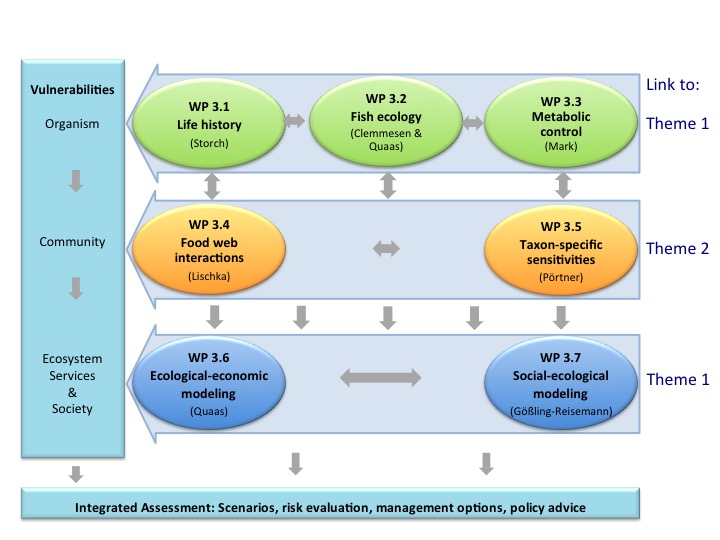BIOACID III – Theme 3: Ocean Acidification and Warming Impacts Across Natural Systems and Society: From Mechanisms to Sensitivities and Societal Adaptation
Building on the knowledge and capacities of ocean acidification and warming effects on marine fish and invertebrates that were generated in BIOACID I and II, this theme sets out to integrate ecophysiological data across all levels of biological organisation (molecule – organism – population – ecosystem) for marine fish and invertebrates.
In an integrative manner, Theme 3 will build a database comprising ocean acidification and warming effects on marine fish and invertebrates from single metabolic pathways to life stage sensitivities and food web and ecosystem interactions. The database will be tailored to the specific needs of this theme and thus allow for a classification of positive and negative effects, of vulnerabilities as well as a parameterisation of effect sizes for several pCO2 ranges, thus making data available for meta-analyses and model information. Such efforts will be carried out within this theme by close cooperation between the different work packages, ranging from fisheries and bio-economic to social-ecological models. The results will then support an integrated assessment of risks associated with ocean acidification across all of BIOACID III.
The main objectives of this theme are:
- Identification of critical metabolic processes, key metabolic thresholds and sensitivity levels within and across several taxa
- Identification of most vulnerable life stages and transition phases of several major taxa to assess consequences for species and whole animal groups in life history
- Evaluation of OAW effects on species and food web dynamics
- Evaluation of OAW driven shifts in ecosystem functioning, habitat loss, marginalization and species replacement in ecosystems of high and low variability
- Meta-analyses and generation of input parameters for models
- Evaluation of trade-offs between ecological (stock size), economic (profits), consumer-related (harvest), and social (fishing effort) objectives for fishery management
- Quantification of uncertainties of OAW effects on commercially important fish populations, ecosystem resilience evaluation and suggestions for economically efficient adaptation of fisheries management
- Evaluation of impacts on ecosystem services and identification of stakeholder concerns and societal adaptation strategies to changes in ecosystem services provision
Research Approaches
In seven work packages, Theme 3 assesses vulnerabilities of marine ectotherms and their life stages from different taxa, habitats, and ecosystems. Based on this assessment, the risks for ecosystem services and affected human societies will be derived. The goal of these work packages is to develop a comprehensive picture of mechanisms causing effects, of the resulting sensitivity thresholds and effect sizes indicating vulnerability of various species and taxa, of effects on selected food-webs and ecosystems, and finally of the socio-economic consequences of ocean acidification and warming.
Led by specialists in their respective fields, the analyses of the work packages of this theme will be based on data available from BIOACID I and II and the current literature, with a specific interest on economically important species in boreal and Arctic latitudes. In a close cooperation between experimental biologists, (socio-) economists, and modellers, the results of the different meta-analyses will be directly incorporated into fisheries and bio-economic models, as well as social-ecological and socio-economic models.
All work packages will develop their own methods of data analysis and also contribute to a shared database, in which current knowledge will be entered and categorised. We will include all available studies that provide information on effects of PCO2 set by carbon dioxide bubbling and within the ranges of a) 500-650, b) 651-850, c) 851-1370, d) 1371-2900, e) 2901-10.000 and f) > 10.000 µatm.
The first level of analysis is directed towards organism responses, and strives to identify sensitive metabolic processes and threshold levels, as well as vulnerable life history stages in various taxa. Via the shared database, this data will then be passed on to the respective stock assessment and ecosystem models directly, as well as to the work packages of higher integration at species, taxon and community levels. The latter will also collect and evaluate ecological and physiological data available for marine ectotherms, yet with a focus on species interactions in food webs and the role and fate of selected taxa in their specific ecosystems. At the highest level of integration, the available data will be used to model and evaluate putative changes in ecosystem services and to develop and inform societal adaptation strategies. These models strive to evaluate the socio-economic costs and uncertainties of ocean acidification and warming for fish stocks and to inform ecosystem-based management and adaptation strategies. In this respect, this topic is directed to provide advice to economic and political decision-makers.
As there is an international recognition of the need for a higher level of certainty in predicting the socio-economic consequences of effects of ocean acidification and warming on marine ecosystems, this theme is also closely linked to the efforts currently made in the UK Ocean Acidification programme (UKOA) to create synergies and prevent parallel developments. Connections exist e.g. with the Centre for Environment, Fisheries & Aquaculture Science (CEFAS), the University of Strathclyde in Glasgow and the Plymouth Marine Laboratory.
Work packages and structure of Theme 3